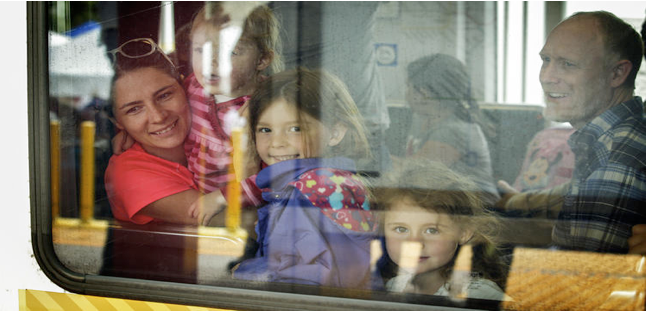CommentsTRANSPORTATION POLITICS-Saturday was a day of celebration for rail fans in the San Gabriel Valley in Los Angeles. The Gold Line extension from Pasadena to Azusa opened, marred only by apparently long lines to get the return train home and then later by a big rig crash on the freeway that shut the whole line down.
But while some rail fans celebrate, I’ll have to be the Debbie Downer here. The Gold Line extension should not have been built as rail, and it was solely the result of a political compromise needed to fund rail in other more meritorious parts of Los Angeles County. It brings rail to a low-density part of the county that would be more economically served by bus rapid transit or even commuter buses running in the right-of-way, at probably 20 percent of the costs of rail.
From the beginning, as I documented in my book Railtown, the Gold Line from Union Station to Pasadena was motivated by politics more than ridership. Higher ridership lines in other parts of the county were bypassed because the Pasadena route had powerful political backers, from then-Mayor Riordan to Republican representative David Dreier, who offered critical bipartisan support for rail in the U.S. Congress because he wanted it to serve his district.
Then this extension came along. Why build rail here, in this low-density part of the county? Back in 2008, rail boosters needed two-thirds support from the county voters for the sales tax increase known as Measure R. The measure would fund important transit projects all around the county, from the Purple Line subway to the Expo Line to Santa Monica.
But San Gabriel Valley leaders threw a fit, and they almost refused to authorize the measure for the ballot, using their allies on the county board of supervisors and in Sacramento to threaten to torpedo the whole thing for everyone.
Why? They felt that they weren’t going to get any projects out of the measure. But in reality, they were slated to get this gold-plated rail line, even though they didn’t deserve it. They were like hostage takers who wanted 100% assurance they’d get their ransom, and this line was it.
Eventually they came around, with much cajoling, and Measure R passed with over two-thirds support. But this project is the consequence of Prop 13, which requires these voter super majorities. Much compromise is required, and therefore some waste of public funds.
In some ways, the Gold Line extension is the price the region has to pay to have more cost-effective rail lines in densely populated parts of the county. And now that the rail line is up, hopefully local leaders will do everything they can to build more housing and offices near the stations. That’s the best (and only) way to salvage this investment.
And if that happens, then the real celebrating can start.
(Ethan Elkind is an attorney who researches and writes on environmental law for the Center for Law, Energy and the Environment (CLEE at the UC Berkeley School of Law. He also has an appointment at the UCLA School of Law’s Emmett Institute on Climate Change and the Environment.) Prepped for CityWatch by Linda Abrams.
















